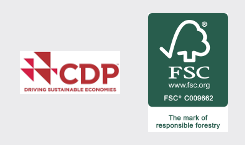Managing our environmental impact
Our business has a well-established culture of safety and operational excellence and aims to provide strong leadership in the pursuit of safe and environmentally responsible workplaces. We are mindful of the importance of minimising the impact our business activities have on the environment and the need to mitigate future risks wherever possible.
A total of 35,000 cremations at our crematoria during 2019 were mercury abated. This represents 54 per cent of all the cremations carried out, which exceeds the required industry standard set by the Department for Environment, Food and Rural Affairs.
We are aware that new technology is in development that will help to reduce nitrogen oxide emissions at crematoria and are supporting the exclusive testing of such equipment in partnership with the manufacturer at one of our sites in Northampton. In addition, we are investigating the potential benefits of alternative fuels and energy recovery as ways of lowering consumption levels. We hope to be able to report positive progress in these areas over the next 12 months.
Dignity's coffin manufacturing facility has ISO14001 certification, an internationally recognised standard for an effective environmental management system that is designed to address the balance between reducing environmental impact and maintaining profitability.
Our coffins are manufactured using raw materials that originate from well-managed and sustainable sources. For example, 98 per cent of the coffins we produced last year were manufactured using timber certified by the Forest Stewardship Council (FSC® C009662).
Waste management services
After carrying out a detailed review of our supplier agreements for waste management we have entered into a new partnership with Veolia to handle our general and mixed recyclable waste on a national basis.
Working with a single provider rather than managing multiple contracts makes the process more streamlined and brings cost savings as well. We track where waste is going once collected and with Veolia’s support our objective over the course of the contract is to ensure nothing is sent to landfill.
Environmental reporting
As part of our ongoing commitment to reduce our carbon footprint and environmental impacts, Dignity has reported to CDP (formerly the Carbon Disclosure Project) since 2008. CDP is a not-for-profit organisation that measures disclosures from thousands of companies and cities across the world. It encourages best practice in reporting and reducing environmental impact through a scoring process.
Scoring is based on a number of criteria designed to assess Energy Management practices and Environmental Strategy, specifically around Performance and Reporting, Risk Management and Business Strategy in relation to climate change.
Dignity's 2019 submission achieved a ‘B’ rating, with 'A' being the highest rating and 'E' being the lowest. We also reported on water and waste management under the Scope 3 requirements.
Greenhouse gas emissions reporting for 2019
The Group reports its greenhouse gas to CDP on an annual basis in tonnes of carbon dioxide equivalent resulting from the combustion of fuel (direct Scope 1 emissions) and that resulting from the purchase of electricity (indirect Scope 2 emissions). The emissions for the last five years are as follows:
|
|
2019 |
2018 |
2017 |
2016 |
2015 |
|
Scope 1 |
15,844 |
16,028 |
15,535 |
15,616 |
14,988 |
|
Scope 2 |
59 |
174 |
423 |
7,106 |
7,455 |
|
Total |
15,903 |
16,202 |
15,958 |
22,722 |
22,443 |
|
Per FTE Employee |
5.2 |
5.3 |
4.8 |
8.0 |
8.2 |
Our energy consumption figures over the same periods are:
|
|
2019 |
2018 |
2017 |
2016 |
2015 |
|
MWh |
94,067 |
95,147 |
92,121 |
91,708 |
87,730 |
Methodology
Our greenhouse gas emissions have been calculated on a per full-time equivalent employee ratio. This intensity metric is the best measure available to the Group given the diversity of the property portfolio, the three separate divisions of the business, and the absence of a similar business to benchmark against.
We have calculated our Scope 1 and Scope 2 GHG emissions since 2010 and work alongside Ecometrica Ltd to assist with our carbon emissions reporting. This supports greater transparency and accuracy of data.
Emissions have derived from accurate consumption information on utility bills, smart meter readings and fuel card data. GHG emissions have been calculated in accordance with the GHG Protocol Corporate Accounting and Reporting Standard (revised edition), using the location based on the Scope 2 calculation method together with the latest emission factors from recognised public sources, principally Defra/DECC. In addition, Dignity’s carbon emissions disclosure has been undertaken in accordance with the Companies Act 2006.
Environmental Initiative

“
Benchmarking allows us to gauge our performance against environmental best practice standards

